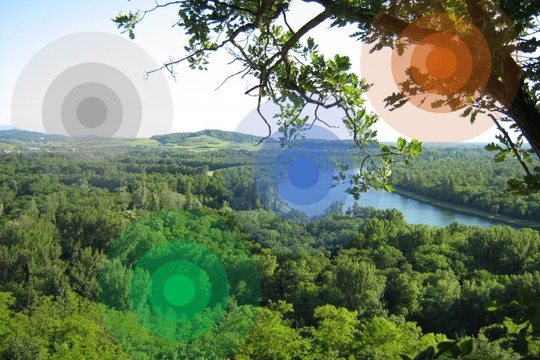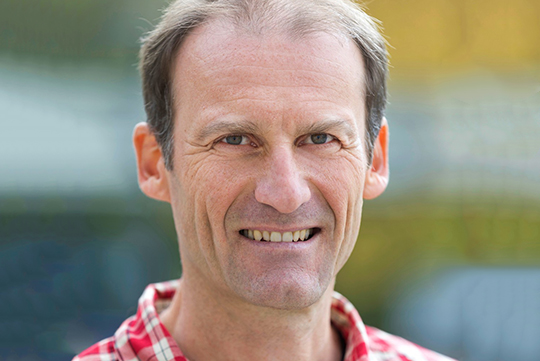“Nature is not an opposite”
Freiburg, Jul 13, 2021
The exhibition and events project Öko-logics, which started at the end of October 2020 in Freiburg and was postponed to summer 2021 because of the corona pandemic, looks at the cultural and scientific exploration of ‘new spheres of the world’. At the center are two related themes: the Anthropocene and Anthropocentrism, which sees humans as being at the heart of everything. The pandemic is not the first global event that affirms the weakness of this perspective on the world. Climate change and the extinction of species also clearly demonstrate that humans do not dominate the situation, we are in the midst of it. The cultural anthropologist Dr. Marion Mangelsdorf and the geobotanist Prof. Dr. Michael Scherer-Lorenzen, who both research at the University of Freiburg, are involved in ‘Öko-logics’ with their own projects. Dietrich Roeschmann asked them about the connections they see between nature and culture and what role these themes play in their work.

What is the sound of nature? Michael Scherer-Lorenzen researches the acoustic signature of an ecosystem using Sound Ecology. Photo: Michael Scherer-Lorenzen
Mr Scherer-Lorenzen, there has been a lot of talk about the Anthropocene recently. Do you find the term plausible?
Michael Scherer-Lorenzen: Stratigraphy shows that since the end of the last Ice Age we have been living in the Holocene geological era. But there are good arguments for being more precise than that. In fact, we have now reached a point where human activity has left such clear traces on the Earth and made such qualitative changes that they will be geologically detectable even after human life has gone. The Dutch researcher Paul Crutzen coined the term ‘Anthropocene’ for this 20 years ago, and yes, I think it’s plausible.
Why?
Michael Scherer-Lorenzen: In my field of research, geobotany, we’ve been observing a change in biodiversity for a long time. The diversity of life is currently undergoing a dramatic change, which it will be possible to detect in many hundreds of thousands and millions of years in the geological sediment. Anyone who analyzes the drill cores from the sediments of our present day will wonder: Why are fossils suddenly missing which really should be here? Why are so many organisms no longer evident?
How does thinking about humans not just as historic, social, or political agents, but as a geological factor change your view of them?
Marion Mangelsdorf: I think the metaphor of mining is helpful here. With mining people began to go into the Earth, to investigate its geological depths, to recover its treasures. This digging changed something in people’s perspective on the world. Today we can observe that nature and culture are far more deeply interconnected than we previously realized. But considering mining: in her book, The Death of Nature, Carolyn Merchant describes how mining metaphors correlate with exploitative relationships to human labor. The idea that humans have to tear treasures out of the Earth can definitely be seen as a rape metaphor, which expresses a lot about the relationship of humans to nature. The term ‘Anthropocene’ describes the appearance of humans in the Earth’s history, [an appearance that] has significantly and increasingly influenced development on the Earth since industrialization. By man’s action he has come so much to be the focus that such large problems have arisen with the things and artifacts and innovations he has initiated that we are having to worry about it more and more.
Michael Scherer-Lorenzen: I agree. The consequences of the massive intervention of humans in the ecosystem have made us aware of the close connection of nature and culture. Take the corona pandemic for example. It tells us something about how we deal with our environment. How we interfere in ecosystems and therefore suddenly become too close to germs that really only belong in the animal population. If we bring people, animals and viruses close together, then we enable them to jump biological boundaries that were previously seen as impassable. The barriers between social and ecological systems develop more and more holes. This suddenly reveals nature and culture as intimately interlinked. However, the pandemic also reveals that there is no ‘outside’ any more for us humans, as we’ve always imagined. Nature is not an opposite, rather, we are part of it, in the middle of it on the narrow horizon of life that envelopes the Earth.

Humans do not have control of the situation, but we have to act: “It teaches us humility, and should encourage us all to discuss what makes a good future,” says Marion Mangelsdorf. Photo: Marion Mangelsdorf
Marion Mangelsdorf: This is what Lynn Margulis and James Lovelock said too in their Gaia hypothesis. They claimed that the Earth with its enveloping atmosphere is a life-form, that we are part of. The image of the Blue Planet, which became so popular in the 1960s after the first moon landing, gives an external perspective which we don’t really have. We don’t have control of this Blue Planet, even if we believe we can save it.
Ms Mangelsdorf, in ‘Öko-logics’ you offer a workshop on Gaia Utopias. What is that?
Marion Mangelsdorf: Margulis and Lovelock described the Earth as a hyperorganism that we also belong to. If we attempt to proceed contrary to its laws, we would cause serious damage and the situation might collapse – both in the atmosphere, which Lovelock researched, and in the world of microorganisms, which was at the heart of Margulis’ work. ‘Öko-logics’ also focuses on this theme, which I want to discuss with other people at a participatory workshop.
Where does the discourse about the Anthropocene sit in cultural anthropology research?
Marion Mangelsdorf: One example: in a joint project with the NGO Biodiversity International we studied the differences in how men and women use forests and asked whether it is possible to gender this differently. As an anthropologist, I was brought in because it was important to have a dialogue with female communities, who don’t connect with public announcements. We succeeded in explaining to women and men their drastically segregated domains and producing an awareness of how they can bring about changes together. We’re all facing massive questions. Whether we are in Azerbaijan, Europe or the Western Ghats mountains: everywhere we see marked changes in biodiversity and ask ourselves how we can respond to this. Given this, we know that humans do not have control of the situation, as we’ve believed ever since the modern era. This is both fascinating and alarming. It teaches us humility, and should encourage us all to discuss what makes a good future. Regardless where.
To what extent does this discussion also relate to your research, Mr Scherer-Lorenzen?
Michael Scherer-Lorenzen: In our work group we deal with the question of what consequences the change in biodiversity has within an ecosystem. Some of these processes have direct effects on our human wellbeing; we call these ecosystem services, that is, things that we receive for free from nature. Clean water, clean air, raw materials, chemicals, substances for medicines – all of this is based on availability in ecosystems. And biodiversity plays a key part in the provision of these services. For instance, if certain organisms that are important to the regeneration of soiled water, such as fungi or bacteria, disappear, these self-cleaning processes will no longer work.

“Seen long term, biodiversity has always increased, so we don’t need to worry about it. But we do need to worry for ourselves,” says Michael Scherer-Lorenzen. Photo: Jürgen Gocke
In ‘Öko-logics’ you are giving a lecture on the ability to represent biodiversity using acoustic means. What does it involve?
Michael Scherer-Lorenzen: My field of research is called Soundscape Ecology. When the birds tweet in the spring, the insects buzz in the summer, the stag roars in the autumn, these are the vocalizations of the animal kingdom. In addition to this there are the noises of wind and water, and the swoosh of traffic and other man-made sounds. Taken all together, these sounds make up the acoustic signature of an ecosystem. We want to use this signature to find out whether it is possible to discern changes in biodiversity at an early stage and make it audible.
What is the role of plants in Soundscape Ecology?
Michael Scherer-Lorenzen: Plants are less sources of noise than mediators here. They make up the habitat and source of food for the many organisms that populate them. And they make forces that affect the ecosystem audible. Not just the wind and rain, but also drought can be perceived acoustically with them, such as when pine cones burst in the heat or dried needles rustle on the ground. Also, trees that are suffering drought stress produce ultrasonic clicks, that are caused by the xylem in the trunk. You can measure this clicking as a way of quantifying the drought stress affecting forests. This is a striking way of making the consequences of climate change audible.
Seen from today, the future isn’t exactly rosy. The concept of ‘Anthropocene’ suggests a catastrophic view of the world, and makes one think rather of an ‘Unhappy Ending’ to it. Is a positive perspective also conceivable?
Michael Scherer-Lorenzen: Yes, of course. If we look for how a Happy Ending would come about, then we can be certain that biodiversity will recover. If there is a sixth mass extinction, this will still only be an episode in the Earth’s history. Seen long term, biodiversity has always increased, so we don’t need to worry about it. But we do need to worry for ourselves. Then again, this too is a positive reflex, because the Anthropocene discourse is relevant: humans are influential. We know what we could do better. We know how we could function and consume sustainably, how we could combine the ecology and the economy. So we just have to do it.
Are we ready for this?
Marion Mangelsdorf: Bruno Latour says: We have to dramatize and we have to dedramatize. I think that’s extremely important. To dramatize, by creating an awareness of how much everything is interwoven – and to dedramatize, in order to be capable of action. It’s about bringing these two approaches in balance. On the one hand, we need to be aware about the complexity of connections and make it clear that there is no simple and convenient solution to the challenges of the Anthropocene. On the other, however, we have to find opportunities for intervening. We must see that things can be turned towards the positive and we can have a part in this.
Michael Scherer-Lorenzen: I’d like to add to ‘dramatizing and dedramatizing’ with something I already mentioned: information and emotion. These could be the two axes along which a discussion about the development of human societies in the Anthropocene era can move. We need information, the latest knowledge, forecasts – these are the tools that science makes available to us, whether in the context of indigenous communities or high-tech research. And we need emotions to understand things fully, not least to enthuse people – especially young people – for something.

